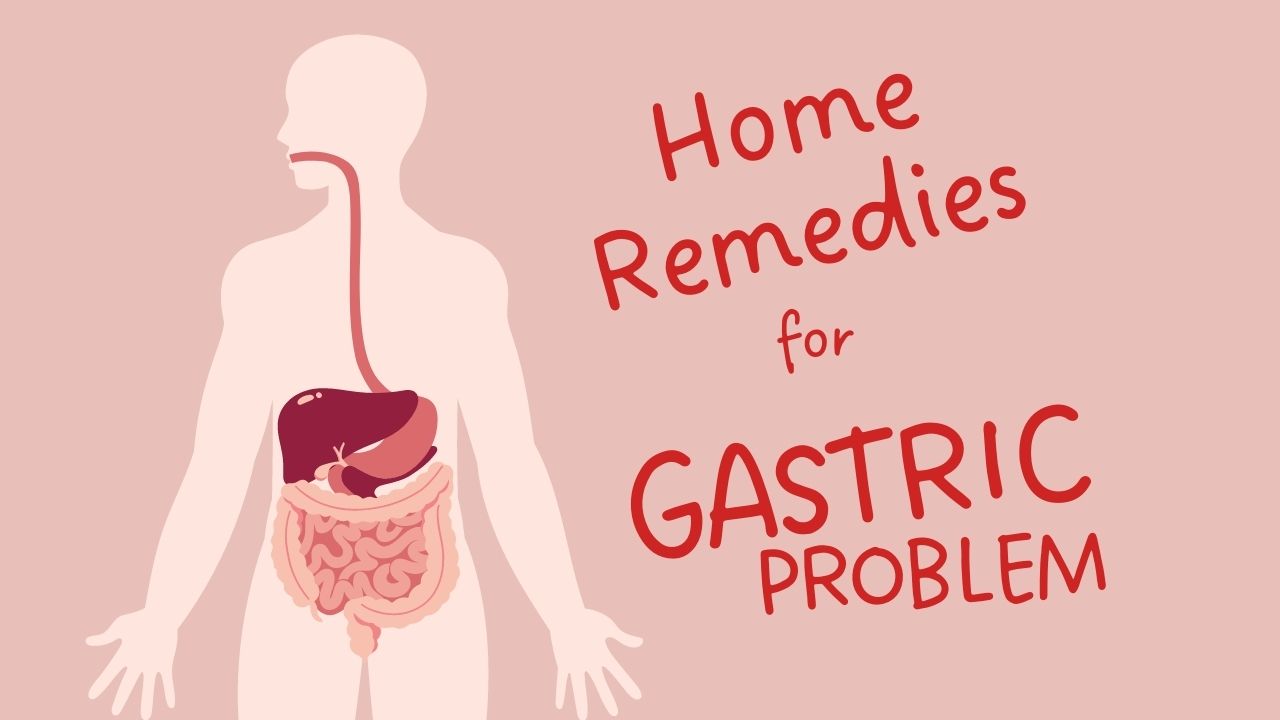Home Remedies for Gastric Problem
What is gastric problem
Gastric problem, also known as gastric disorder or gastrointestinal issue, refers to a number of conditions affecting the stomach and digestive tract. This occurs when there is a disruption in the normal functioning of the digestive system, causing discomfort and various symptoms.The stomach plays an important role in digestion, breaking down food and mixing it with digestive juices to extract nutrients. Gastric problems can affect any part of the digestive tract, including the stomach, esophagus, small intestine or large intestine.
Causes of gastric problems
Gastric problems can result from a variety of factors, from dietary choices to underlying medical conditions. Understanding the causes can help in identifying triggers and preventing or managing gastric problems effectively. Here are some common reasons:Bad eating habits:
Food intolerance:
Stress and anxiety:
Smoking and alcohol consumption:
Hormonal changes:
Obesity:
It is important to know that these causes may vary from person to person and individual factors may contribute to the development of gastric problems. If you experience severe symptoms, consultation with health care professional is recommended for a proper diagnosis and personalized treatment plan.
What are the symptoms of gastric problems
Gastric problems can cause discomfort in the stomach and digestive system. Recognizing the symptoms can help you identify when you are experiencing gastric problems. Here are some common symptoms explained in simple language:Bloating:
Indigestion:
Acid reflux:
Abdominal pain:
Gas:
Nausea and vomiting:
Change in bowel movements:
Feeling full:
Loss of appetite:
Fatigue:
Remember, these symptoms can vary from person to person and their severity can also vary. If you experience persistent or severe symptoms, it is advised to consult a healthcare professional for proper evaluation and guidance.
Home Remedies for Gastric Problem
Home Remedies for Gastric Problem
Ginger
Ginger is a powerful herb with natural digestive benefits. It helps stimulate saliva, bile and gastric enzymes, aiding digestion and reducing gastric discomfort. You can consume ginger in various forms, such as ginger tea or ginger capsules. To make ginger tea, simply grate fresh ginger root and soak it in hot water for 10-15 minutes. Adding a little honey enhances both the taste and benefits of the tea. However, it's important to note that consuming excessive ginger can cause heartburn or worsen some conditions, so moderation is key.Peppermint
Peppermint has long been used to soothe digestive problems due to its antispasmodic properties. It helps in relaxing the muscles of the gastrointestinal tract, reducing gas and bloating. Peppermint tea is a popular option for getting relief from gastric problems. You can either buy pre-packaged peppermint tea bags or steep fresh peppermint leaves in hot water. For optimum results drink the tea slowly after meals.Chamomile
Chamomile, known for its calming effect, may also help soothe gastric discomfort. It has anti-inflammatory properties that can reduce inflammation in the stomach lining and provide relief from indigestion. Make a cup of chamomile tea by steep dried chamomile flowers in hot water for 10-15 minutes. Drinking chamomile tea before bed may promote relaxation and aid digestion. However, individuals with ragweed allergies should exercise caution, as they may also be sensitive to chamomile.Fennel
Fennel is a popular herb with carminative properties, which means it helps prevent gas build-up in the gastrointestinal tract. It can effectively reduce bloating, cramping and flatulence. It is a common practice to chew fennel seeds after meals to promote digestion and reduce gastric problems. You can also make fennel tea by grinding fennel seeds and soaking them in hot water. However, pregnant women should consult their healthcare provider before consuming fennel, as it may stimulate uterine contractions.Apple vinegar
Apple cider vinegar (ACV) has been used for centuries to improve digestion and balance stomach acid levels. Despite its acidic nature, apple vinegar actually has an alkalizing effect on the body. One to two tablespoons of raw, unfiltered apple vinegar can be consumed mixed with a glass of water. Drink this mixture before meals to aid digestion. It is important to note that apple vinegar should always be diluted before consumption, as undiluted apple vinegar can erode tooth enamel and cause throat irritation.Aloe vera
Aloe vera has a soothing effect on the stomach lining and can provide relief from gastric problems. It has anti-inflammatory properties and can help heal the digestive system. You can consume aloe vera juice or gel, which is available in health food stores. It is important to choose a product that is specifically formulated for internal use and follow the recommended dosage. However, individuals with aloe vera allergies or those taking certain medications should consult their healthcare provider before using it.Licorice root
Licorice root has been used for centuries in traditional medicine to address various gastrointestinal issues. It contains compounds that help reduce inflammation and protect the stomach lining. Licorice root can be consumed as a tea or as a supplement. Licorice tea can be prepared by soaking slices of licorice root or dried licorice root in hot water for 10-15 minutes. It's worth noting that licorice root should be used in moderation, as excessive consumption may increase blood pressure or potassium levels.Slippery elm
Slippery elm is an herb known for its soothing properties on the digestive system. It forms a gel-like substance when mixed with water, which can help coat and protect the stomach lining. You can find slippery elm in powdered form and mix it with water to make a soothing drink. It is important to drink plenty of water along with slippery elm to aid in its effectiveness.Cumin
Cumin is traditionally used to aid digestion and relieve gas and bloating. They contain compounds that stimulate the release of digestive enzymes, promoting better digestion. You can consume cumin after roasting and grinding it into powder. Mix one teaspoon of this powder in hot water or herbal tea and drink it after meals. Cumin can also be used as a spice in cooking to enhance the flavor of your food along with promoting better digestion.Papaya
Papaya is a tropical fruit that contains an enzyme called papain, which aids in the breakdown of proteins and promotes digestion. Eating ripe papaya or drinking fresh papaya juice soothes the stomach and provides relief from gastric problems. Papaya is also rich in fiber, which can help regulate bowel movements and prevent constipation. However, individuals with latex allergies should exercise caution, as they may also be allergic to papaya.Probiotics
Probiotics are beneficial bacteria that promote a healthy gut microbiome. They may help improve digestion and reduce symptoms of gastric problems such as bloating and gas. Mainly probiotics in fermented foods such as yogurt, kefir, sauerkraut and kimchi. Alternatively, probiotic supplements are available in capsule or powder form.Cinnamon
Cinnamon not only adds a delicious flavor to dishes but also offers digestive benefits. It helps in relieving gas, bloating and indigestion. You can sprinkle cinnamon powder on your oatmeal, yogurt or smoothies, or drink cinnamon tea by adding a cinnamon stick to hot water. However, excessive consumption of cinnamon can be harmful, especially for people who have liver problems or are taking blood-thinning medications. Stick to moderate amounts and consult your healthcare provider if you have any concerns.How to avoid gastric problems for long term
Gastric problems can be uncomfortable and disrupt our daily lives. To prevent these issues from occurring in the long run, it is important to make some simple lifestyle changes. Here are some easy steps to help you avoid gastric problems:
Eat mindfully: Take your time while eating and chew your food thoroughly. Eating too often can lead to swallowing air, bloating and gas. Additionally, avoid overeating and try to eat smaller, more frequent meals throughout the day.
Follow a balanced diet: Include a variety of fruits, vegetables, whole grains and lean proteins in your diet. Limit your intake of spicy, greasy and fatty foods as they can trigger gastric discomfort. Avoid excessive intake of caffeine, carbonated drinks and alcohol, as these can irritate the stomach.
Stay hydrated: Drink plenty of water throughout the day. Staying hydrated helps maintain proper digestion and prevent constipation, which is a common cause of gastric problems. Limit your intake of sweetened beverages and opt for water or herbal tea instead.
Stress Management: Stress and anxiety can have a negative effect on digestion. Find healthy ways to manage stress, such as practicing relaxation techniques, getting regular physical exercise or pursuing a hobby that helps you relax. Consider activities like yoga, meditation or deep breathing exercises.
Quit Smoking: Smoking not only harms your overall health but also increases the risk of developing gastric problems. Quitting smoking can greatly improve your digestive health and reduce your chances of acid reflux and gastritis.
Maintain a healthy weight: Being overweight or obese puts pressure on the stomach, which leads to acid reflux and other gastric problems. Focus on maintaining a healthy weight through regular exercise and a balanced diet.
Avoid Trigger Foods: Identify any food items that trigger gastric problems for you personally. Common culprits include spicy foods, fatty foods, citrus fruits and carbonated drinks. Pay attention to your body's response and avoid these trigger foods whenever possible.
Practice good hygiene: Wash your hands thoroughly before eating to prevent the spread of bacteria that cause gastric infections. Be wary of consuming unhygienic or contaminated food and water, especially when traveling to areas with inadequate sanitation.
Limited drug use: Overuse of certain drugs such as nonsteroidal anti-inflammatory drugs and aspirin can irritate the stomach lining and contribute to gastric problems. Consult your healthcare provider before taking any new medications and follow their recommended dosage.
Get regular check-ups: Have regular check-ups with your healthcare provider to monitor your overall digestive health. They can identify any underlying conditions or risk factors and provide guidance on maintaining a healthy digestive system.
By following these simple tips, you can reduce your chances of experiencing gastric problems and enjoy better digestive health in the long run.
Remember, if you have persistent severe symptoms, it is important to consult a health care professional for proper diagnosis and personalized advice.
Conclusion
Gastric problems can be bothersome, but fortunately, there are many effective home remedies for gastric problem that can provide relief. Ginger, peppermint, chamomile, fennel, apple cider vinegar, aloe vera and licorice root are natural remedies with digestive benefits. Incorporating these remedies into your daily routine can help reduce gastric discomfort and promote better digestion. However, it is important to remember that severe or chronic symptoms should be evaluated by a health care professional. By exploring these natural alternatives, you can find comfort and relief from gastric problems.What causes gastric problem?
Gastric problems can be caused by poor eating habits, such as overeating or consuming spicy and fatty foods. Other causes include stress, infection such as H. pylori, certain medications, smoking, alcohol, hormonal changes, obesity and underlying medical conditions such as GERD or IBS.
What is the symptoms of gastric problem?
Symptoms of gastric problems include bloating, indigestion, acid reflux, abdominal pain, gas, nausea, changes in bowel movements and a feeling of fullness.
Which food is good for gastric problem?
Certain foods can help ease gastric problems. Opt for a fiber-rich diet rich in fruits, vegetables and whole grains. Include lean proteins such as fish and chicken. Probiotic-rich foods such as yogurt can aid in digestion. Additionally, drink plenty of water and herbal teas to stay hydrated and support a healthy digestive system.
How to relieve gastritis pain fast?
To relieve gastritis pain quickly, try drinking chamomile or ginger tea, which can help soothe the stomach. Avoid spicy and acidic foods, opt for smaller, more frequent meals and consider over-the-counter antacids for temporary relief.
How to cure gastric problem?
It is important to take a holistic approach to cure gastric problems. Make dietary changes by avoiding trigger foods and choosing a balanced diet. Manage stress levels, maintain a healthy weight and stay hydrated. If symptoms persist, consult a health care professional for proper diagnosis and individualized treatment plan.

.png)


.jpg)
%20(1).jpg)
%20(1).jpg)
.jpg)






.jpg)
.jpg)
.png)

